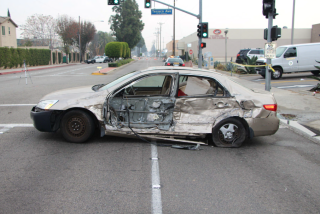Honda Cleared of Blame in All-Terrain Vehicle Mishap
- Share via
SAN DIEGO — Capping a trial monitored by attorneys and consumer groups nationwide, a San Diego Superior Court jury on Tuesday concluded that Honda Motor Co. was not responsible for an accident in which a boy suffered brain damage and other injuries after falling from one of the company’s three-wheeled all-terrain vehicles.
The jurors’ 10-2 verdict, reached after 2 1/2 days of deliberations, means that 15-year-old Frank Cusimano Jr. will receive no compensation for injuries he suffered when he tumbled from the back of a Honda 110 All-Terrain Cycle in 1982. Cusimano, who was 9 at the time, was a passenger on the vehicle, which was being driven by an 8-year-old neighbor boy.
Three-wheeled all-terrain vehicles have been widely criticized as dangerous. Hundreds of riders, many of them young, have been killed or injured in recent years. Honda and three other major manufacturers recently agreed to remove the vehicles from the market, although jurors were not permitted to consider the withdrawal in their decision.
During the six-month trial, Cusimano’s attorneys alleged that the popular but controversial machines were inherently unstable and defective because of their three-wheel configuration, balloon tires and lack of a key to control their use.
But in interviews after their verdict was announced by Judge Ben Hamrick, two jurors said they believe the evidence proved otherwise.
“It was a tough one, because we all felt terrible about the poor kid’s injuries,” said juror Warren Carey, a computer systems technician. “But it was clear that Honda had fulfilled its responsibility to warn the rider of the risks of the ATV. The company did its part to let people know about the potential dangers, through warning labels and so forth.”
Juror Don Caro agreed and said Cusimano’s parents bear some blame for failing to take precautions to protect their son’s safety.
“Everyone has to take responsibility for their own actions, and parents also must supervise their youngsters, help them learn how to ride,” Caro said. “Mr. Cusimano did not have a history of that. He did not get involved. That doesn’t mean he’s a bad parent, but he does bear some responsibility for this.”
Frank Jr. and other members of the Cusimano family, present in the courtroom during most of the trial, were absent when the verdict was read and could not be reached for comment. The family’s attorney, Craig McClellan, said they were “stunned” and “saddened.”
Tuesday’s verdict comes just weeks after Honda and three other companies that manufacture the vehicles agreed to stop the sale of the machines, buy back all three-wheeled ATVs in dealer inventories, place warning labels on vehicles and launch a nationwide safety training campaign. The agreement did not affect four-wheeled ATVs.
The agreement was negotiated in the wake of statistics showing that ATVs have caused 20 deaths and 7,000 injuries a month for the last two years. About half the victims since 1982 have been under 16.
Not Used in Court
Hamrick, however, would not allow the sales ban to be brought up in the case, a ruling that the Cusimanos’ attorney fought hard.
Despite the sales ban, Honda’s attorney in the San Diego case, Richard Bowman, said that the industry “will by no means stop defending the integrity of our products. We at Honda feel very strongly about this (three-wheeled) product and this jury certainly does too.”
Steven Archer, a Los Angeles attorney who has handled about six ATV-related cases and closely watched the San Diego proceeding, said the verdict was “unfortunate” but would not bar future claims for injuries and fatalities associated with the vehicles.
Archer noted that future juries will have knowledge of the recent sales ban on the three-wheel models and predicted that “will carry some weight.”
“As long as there are vehicles out there--and there are 1 million three-wheelers out there--you are going to see the crippling injuries and deaths and more litigation. Eventually, these will come down in our favor,” Archer said.
Appeal Possible
McClellan, who sought $6.8 million in damages, indicated that he would appeal. He said he believes evidence regarding comparative injury and death rates associated with other types of recreational vehicles swayed the jury in Honda’s favor.
Such statistics show that the risk of injury from snowmobiling and even bicycling is as great or great er than that from riding ATVs.
The trial drew nationwide attention from personal injury lawyers and others because it featured testimony from one of Honda’s top corporate officials. Honda attorneys resisted attempts to subpoena Tetsuo Chino, but the senior managing director of Honda Motor Co. was ultimately compelled to testify by the state Supreme Court.
In four days on the witness stand, Chino, who also is chairman of Gardena-based American Honda Motor Co., defended the company’s products and its record of correcting alleged deficiencies. He said an inquiry into consumer complaints had produced a report concluding that accidents are caused by rider irresponsibility.
Bob Astenius, an ATV enthusiast who runs a Big Bear-based company that conducts training courses for off-road vehicle riders, praised the verdict, saying that his experience has led him to conclude that tragedy occurs when riders are unskilled.
“Our company has trained over 73,000 riders and my opinion is the major cause for these horrible accidents and fatalities has been rider attitude and behavior,” said Astenius.






